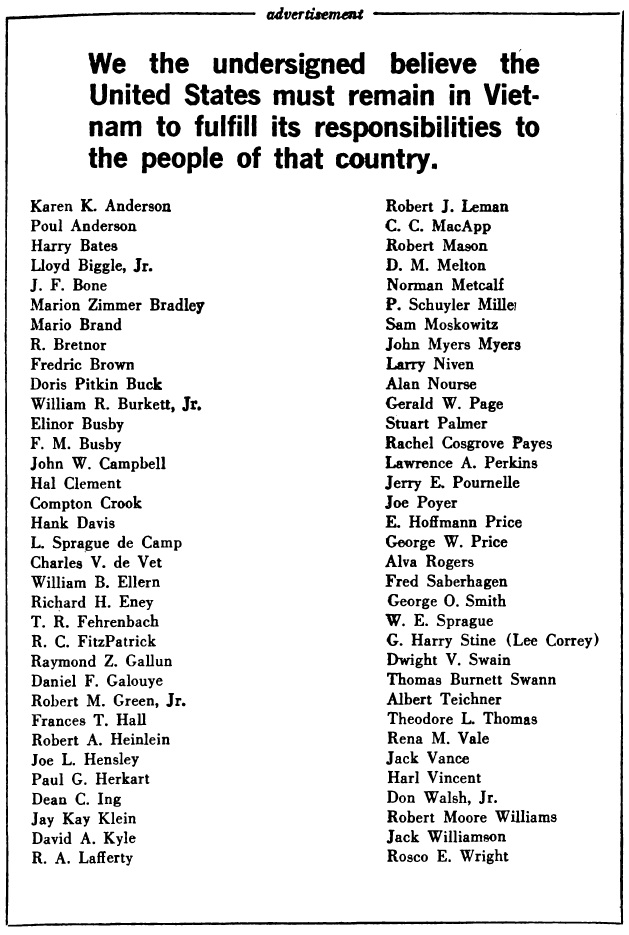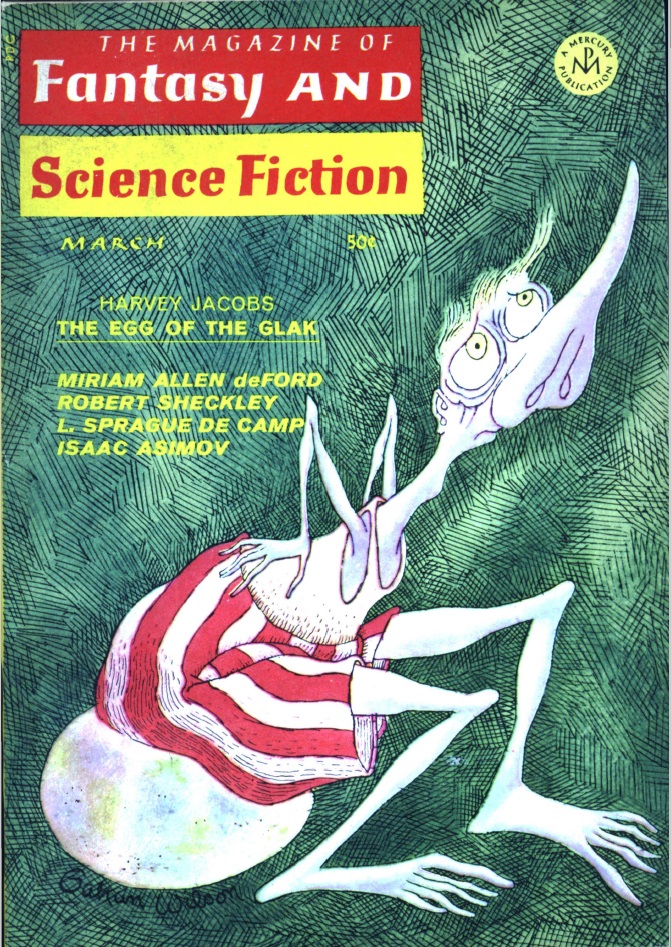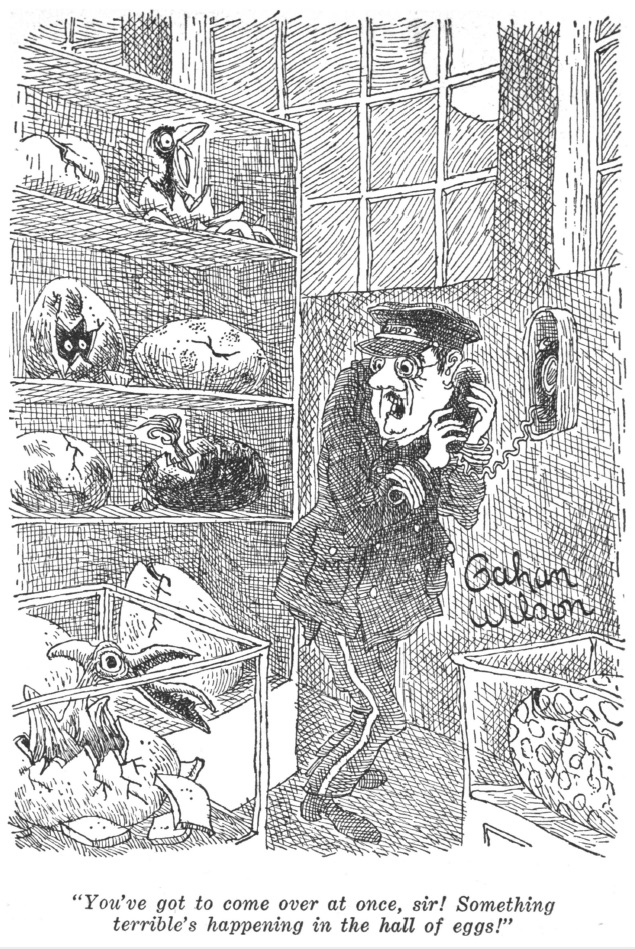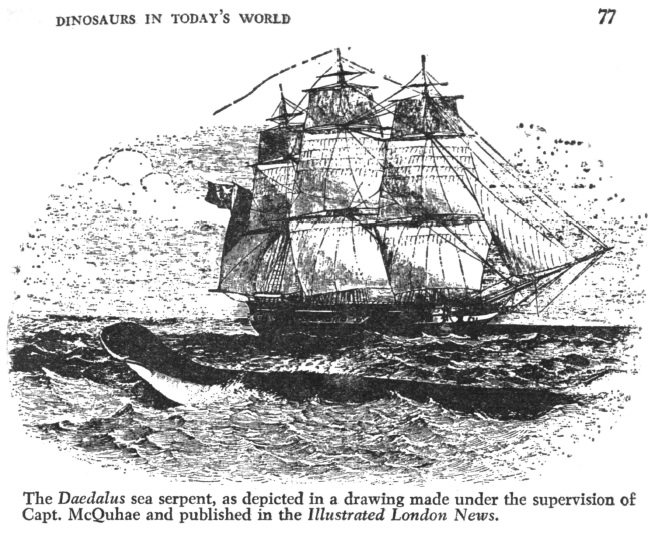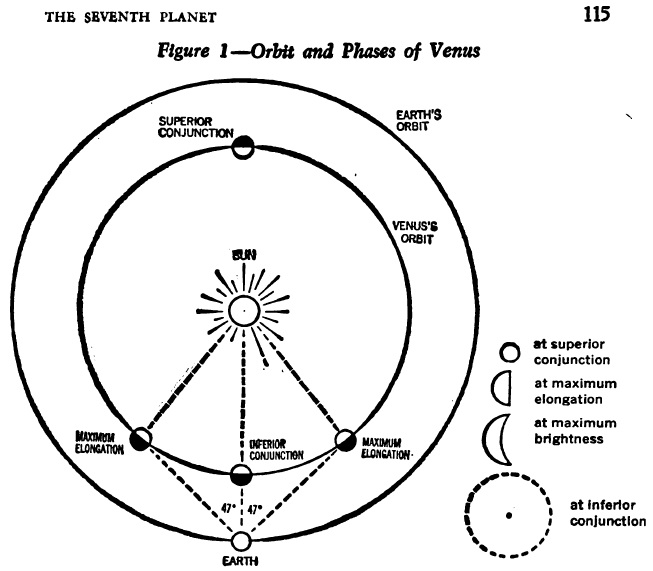
by Gideon Marcus
Hail to the Chief
I mentioned a few months back that Tony Boucher, one of the original editors for The Magazine of Fantasy and Science Fiction had passed away. Because of the vagaries of publication, it took this long for F&SF to solicit eulogies for Tony and get them in print. But a finer tribute, I can't imagine.
Some of SF's greatest luminaries pay their respects: Poul Anderson, Isaac Asimov, Randall Garrett, Philip K. Dick, Avram Davidson…but what impressed me even more was how many prominent women authors appear, too–Judith Merril, Mildred Clingerman, Margaret St. Clair, Miriam Allen DeFord. It is fitting that so many of the fond rememberers are women; F&SF, particularly in the Boucher years, was by far the biggest SF publisher of woman-penned SFF.
Those were great days, the Boucher reign, when virtually every issue was a winner (sort of like the Gold days at Galaxy). And half the stories we picked for our anthology of SF by women from 1953-57, some of the very best science fiction of the time, came from the pages of F&SF.
It is a shame that the appearance of these names from yesteryear evoke a pang of loss perhaps greater than the passing of Mr. Boucher. Except for a few notable rallies, F&SF has been on a slow, inexorable downward trend since 1959, it's last superlative year. This issue is no exception. While it is not crammed with wholly unworthy material, nor is it anywhere near the standards it used to maintain.
Let me show you…

by Gahan Wilson
The House that Tony Built
The Devil and Jake O'Hara, by Brian Cleeve
I was less than enthusiastic about Brian's last story about Old Nick, in which Satan is cast out of hell along with a lowly sidekick when the souls of Hell unionize and go on strike. This one is a step downward.
All Lucifer needs to break the strike is one measly member of the damned who will cross the picket lines and turn the power back on in the underworld. He sets his eyes on an Irish lush who sells his soul for a bottle of quality whiskey. His daughter adds a few amendments to the deal, but it doesn't really matter. Ultimately, the sot goes to Hell, though the result is not what the Prince of Darkness wants.
There's just too much affected dialect, meandering, and oh-so-cleverisms. What could be a workable premise is, instead, tedious. And this is from someone who likes Deal-with-the-Devil stories.
Two stars.
Sos the Rope (Part 2 of 3), by Piers Anthony
[As with last time, Brian has graciously offered to stand in so I don't have to suffer through Anthony's latest "masterpiece"…]

by Brian Collins
To show once again that democracy is a flawed system, Piers Anthony is now a Hugo nominee! I can scarcely fathom some people’s enthusiasm for his debut novel Chthon getting nominated for Best Novel. His second novel, Sos the Rope, may redeem itself by the final installment, but the chances of it recovering are not high. There is one positive that can be said of this middle installment immediately: it’s short.
Not much happens here, and at only about 25 pages there isn’t much opportunity for Anthony to bless us with his worst habits, all involving women. To recap, it’s America a good century after a nuclear catastrophe, and two rogues, Sos and Sol, agree to a one-year partnership while the latter builds a tribe, one combatant at a time. The two are good friends and respect each other as warriors, but Sos is weaponless while Sol is unable to beget children of his own. Their friendship is complicated when Sol’s wife in name only, Sola, takes a strong liking to Sos and the two eventually have sex behind Sol’s back, leaving Sola pregnant with Sos’s child. This is unfortunate for everyone, including the reader. But by now the one-year contract has run out and Sos and Sol agree to part ways, with Sos returning to a crazy-run hospital where he grew up and where he learned to read.
Another positive thing I can say is that since Sola is virtually absent in this installment, and since Sol only appears at the beginning and end, we’re taken away from the plot to be given more of an explanation as to the workings of this post-apocalyptic world. It’s during his time away from Sol’s tribe that Sos finally decides to take on another weapon—this one the long heavy rope of the title. It’s about halfway through the novel that we finally get the weapon that would become part of the hero’s name. I still cannot properly describe how much I object to the naming system Anthony concocted here. It only gets more aggravating when Sos eventually returns to the tribe and finds that Sol now has a daughter named—wait for it—Soli. Sos and Sola still want each other but the latter refuses to give up Sol’s name and Sol himself refuses to give up his adoptive daughter. A fight in the battle circle, possibly to the death, ensues!
Anthony still cannot write compelling action scenes, and he still cannot write women above the level of depicting them as instigators of doom. A recurring implication here is that Sos and Sol would turn out fine, at worst going down different paths amicably, if not for Sola’s meddling. At the same time I was not offended so much this time.
If I turn my head on its side I might be able to stretch this installment to 3 stars, because it is a relatively painless experience and even mildly enjoyable in a few places, but that implies a tepid recommendation and I can’t lie to readers like that. Strong 2 out of 5 stars.

by Gideon Marcus
The Twelfth Bed, by Dean R. Koontz

by Gahan Wilson
This one takes place in a futuristic rest home, where the aged are confined in their last years under the beneficent but iron care of robot wards. One day, a young accountant is checked into the home by mistake. Try as he might, he can't get out…until he brews a revolt.
Koontz is a writer with a lot of promise, and he did manage a 4-star tale last month, but most of his stories have some kind of issue. For this one, it's that the setup is a bit too contrived to really engage sympathy. Maybe it's supposed to be satire, but again, it plays things to straight if that's the case. Moreover, I read a similar (and better) story in Fantastic three years ago (Terminal, by Ron Goulart).
Anyway, three stars, and keep trying Dean!
2001: A Space Odyssey, by Samuel R. Delany and Ed Emshwiller
Two of my more favorite people provide reviews of Kubrick/Clarke's epic film, 2001: A Space Odyssey. They are interesting perspectives, one from a vivid fictioneer, and one from a gifted illustrator and artist.
Chip (Delany) actually favored the original three-hour version that was cut within a week of its premiere, asserting that the irony of the HAL segment is sharper, and the disorientation of the weightlessness scenes settle in more viscerally. I don't know if that kind of glacial pacing would have been an improvement, but on the other hand, the only time I felt even slightly restless when I watched the film was during the transit scene near the end, so maybe I missed out.
Emsh praises the effects and spends most of his time discussing them rather than the story, which he seems to find serviceable, if not stellar.
It's a better pair of reviews than, say, Robert Bloch's blistering affair (in which Bob calls the monolith a "cylinder" for some reason–sadly, I can't remember where I saw it. A fanzine, I think.)
Four stars.

Death to the Keeper, by K.M. O'Donnell
This piece is book-ended by the protestations of a producer of a television program, disclaiming all responsibility for what ensued on his show, Investigations. It seems he hired a has-been actor to re-enact the recent assassination of a public figure (presumably, echoing the murder of JFK). The actor went meshuginnah and actually assured that he actually got killed in a sort of expiation of public sins. We know this from the interminable, raving diary the actor left behind explaining his motivations.
I really don't know what to make of this story. While I'm not the biggest fan of J.G. Ballard, I found his utlization of the Kennedy assassination (and other cultural touchstones) to be more effective. Certainly more readable, despite the outré nature of his composition. O'Donnell just seems like he's trying too hard.
And as with his earlier story satirizing war, it's clear he believes in writing ten words when two would suffice.
One star.
A Sense of Beauty, by Robert Taylor
It is the last night of a short-lived affair, for the male half is leaving. And not just away from his lover, but from Earth. You see, he is an alien, sort of, a member of an extraterrestrial race of humans, and Earth is doomed to soon be consumed in a natural nova. He was sent to our world to gather our finest art treasures, these to form a legacy of our lost race.
The tale is reasonably well executed, but its effectiveness is reduced both by the mawkishness of the scenario and that of its participants (the woman is hysterical, the man poor at communicating), as well as the fact that, again, this feels like a story I've read before, one that was done better. I just can't remember which one it was…
Maybe Taylor, who is a novice, will realize his potential with a more original story next time out. For now, three stars.
The Terrible Lizards, by Isaac Asimov
I was just thinking that I wanted a nice survey on what we know about dinosaurs in 1968, and the good Doctor has presented one. As a bonus, he tell us some horrible things about Sir Richard Owens, a preeminent dino-hunter in the last century.
I enjoyed learning the greek roots of the various dinosaur names as well as the relationship between dinosaurs, mammals, birds, crocodiles, and turtles.
Four stars.
Soldier Key, by Sterling E. Lanier
Lanier is another newcomer, but this is his second story, and he seems to have found his footing very quickly. This is the tale of a British Brigadier, the sort with decades of experiences and a knack for storytelling. Apparently, Lanier has a whole treasure chest of stories that the Brigadier will tell, which we'll get to see as F&SF publishes them.
This particular piece involves the time the Brigadier went Caribbean island-hopping in a small boat with his friend, Joe, and two local seamen, Maxton and Oswald. They learn of Soldier Key, a little spit of land inhabited by the queerest of ex-Britishers, dedicated to an unholy church and with an unhealthy adoration for giant hermit crabs.
The plot is Lovecraftian, but without the undercurrent of racism (indeed, the story is quite anti-racist). I found it engaging, thrilling, and also satisfying. Not just horror for horror's sake, but threaded with light–the light provided by decent human beings remaining human in the face of inhumanity.
Four stars.
Urban blight
Well, that wasn't all bad, thankfully. Still, 2.4 is a pretty dismal aggregate. Compare that to the 3.3 average for 1959. Also, for all the female participation in the eulogizing, there are no fiction stories from women this issue. In fact, there have been only six stories by women this entire year.
We could stand to go back to the '50s in more ways than one…

Tony Boucher, with friend, in 1954
 </small
</small


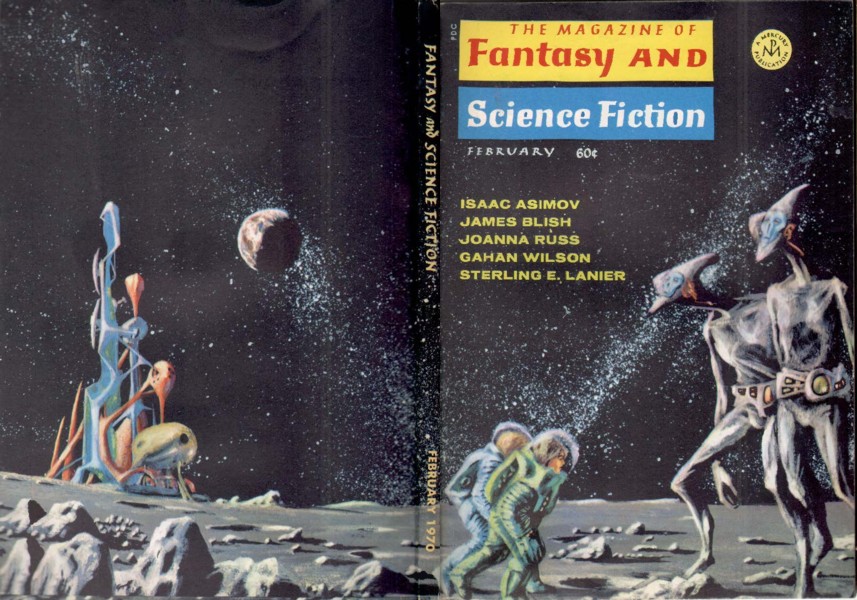

![[January 20, 1970] Jolly good Ffelowes (February 1970 <i>Fantasy and Science Fiction</i>)](https://galacticjourney.org/wp-content/uploads/2025/01/700120fsfcover-672x372.jpg)
![[October 24, 1969] How sweet it isn't (November 1969 <i>Fantasy and Science Fiction</i>)](https://galacticjourney.org/wp-content/uploads/2024/10/691024fsfcover-639x372.jpg)


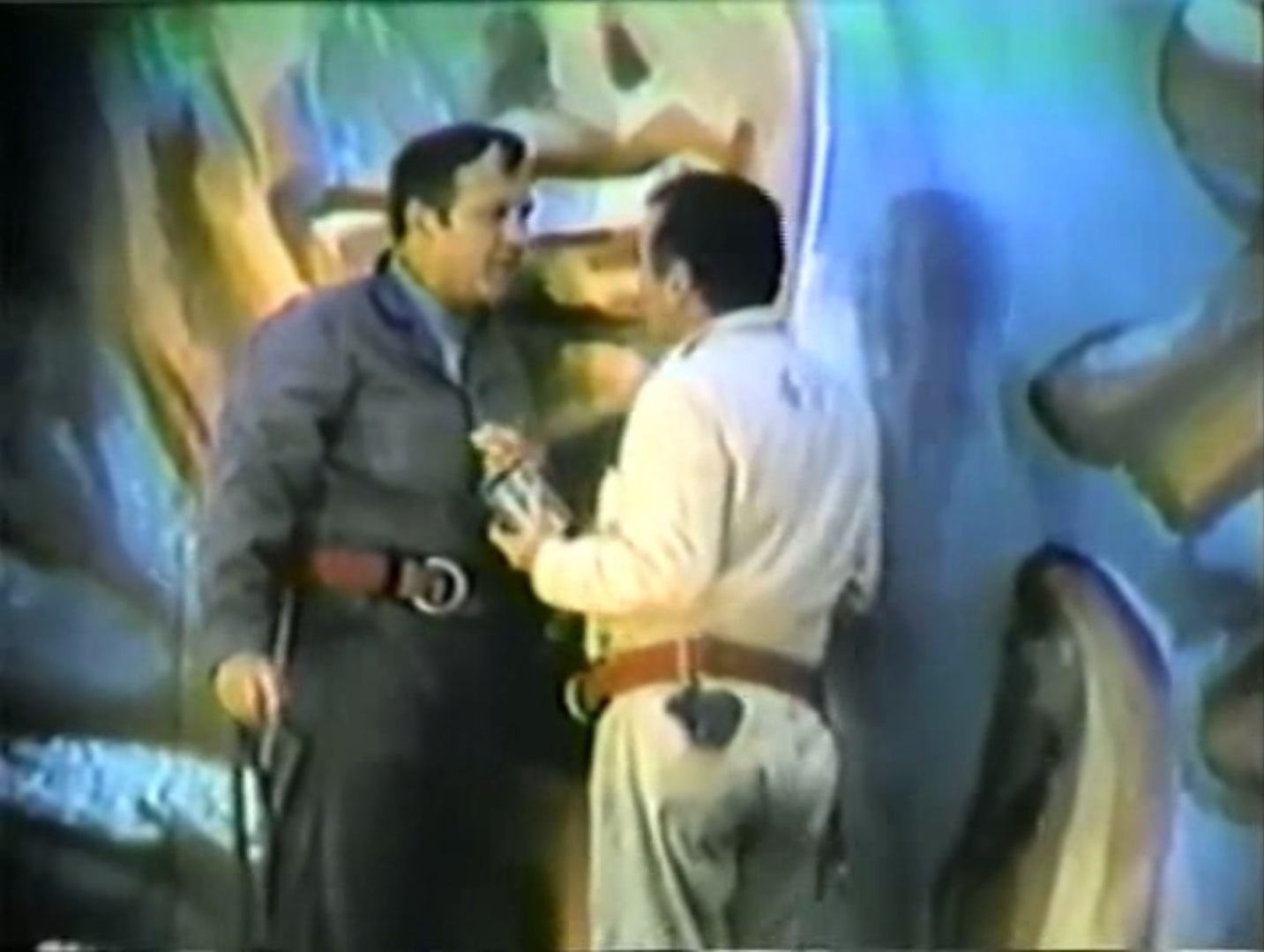
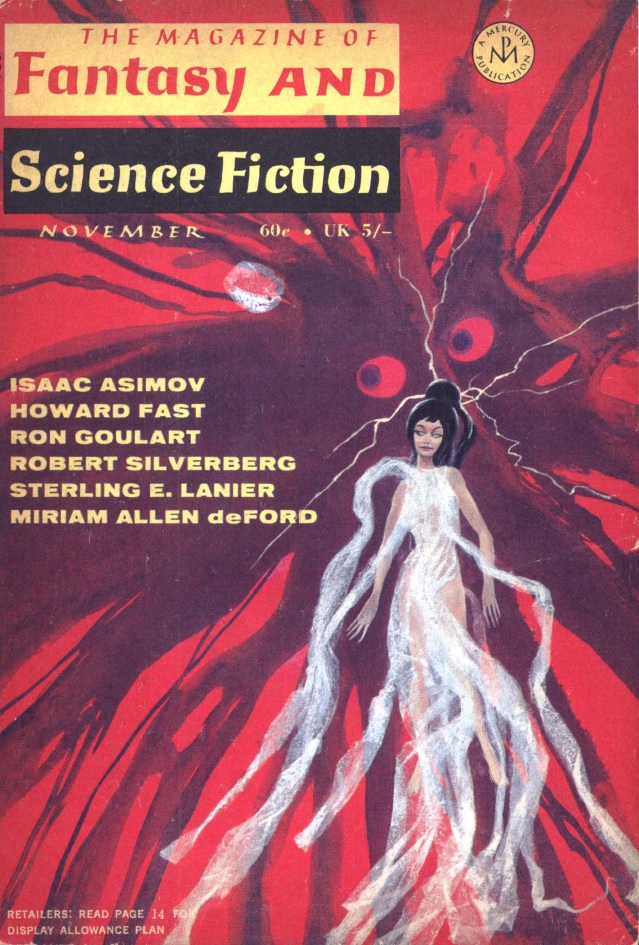
![[July 20, 1969] Today's the day! (August 1969 <i>Fantasy and Science Fiction</i>)](https://galacticjourney.org/wp-content/uploads/2024/07/690720guide-672x372.jpg)


![[September 2, 1968] What might have been (October 1968 <i>IF</i>)](https://galacticjourney.org/wp-content/uploads/2023/08/IF-1968-10-Cover-672x372.jpg)



 Scientists on Mars make an unexpected find. Art by Chaffee
Scientists on Mars make an unexpected find. Art by Chaffee![[July 22, 1968] Shades and Shadows (August 1968 <i>Fantasy and Science Fiction</i>)](https://galacticjourney.org/wp-content/uploads/2023/07/680722cover-664x372.jpg)






![[February 20, 1968] 1-2-3 What are we fighting for? (March 1968 <i>Fantasy and Science Fiction</i>)](https://galacticjourney.org/wp-content/uploads/2023/02/680220cover-671x372.jpg)
